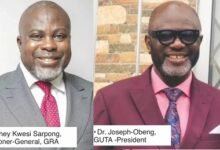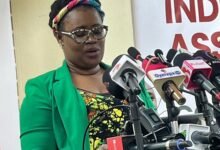There is nothing untoward legislating against – Speaker of Parliament
The Speaker of Parliament, Alban Sumana Kingsford Bagbin, has said that there is nothing untoward in Ghana’s quest to legislate against Lesbian, Gay, Bisexual, Transgender, Queer, Intersex (LGBTQI).
The Speaker said per the cultural beliefs of the country and the ground swell of support for the Bill, which sought to proscribe same sex relations, there was an urgent need to legislate against the practice.
“There is nothing untoward; nothing wrong with the efforts by Ghana’s Parliament to legislate on the promotion of human sexual rights and family values in Ghana, using our constitution as a compass,” he declared.
The Speaker was speaking in a meeting with Members of the British House of Lords and the House of Commons at Westminster, London, last Wednesday.
To him, veiled threats of withdrawal of investments and international aid, and other stringent economic measures which have become preconditions in the continent’s effort at protecting its culture, values, and societal norms and to safeguard the future of its youth was not the way to go.
“Threats are not the way to go. If your neighbour or partner has a problem, you help him to solve it. Boycotts and threats do not solve problems: engagement and understanding do,” he told his hosts.
The processes underway to pass the Proper Human Sexual Rights and Ghanaian Family Values Bill, 2021, the Speaker, said were in consonance with the 1992 Constitution and the Standing Orders of the House, and that Parliament was aware of the copious human rights provisions in the Constitution of the country and would not pass a legislation that stifles the rights of people.
Parliament knows that “any legislation that detracts from the human rights and freedoms guaranteed by our constitution will be a candidate for litigation in our court of law,” he said.
Responding to a question on the role of the President in the bill under reference, the Speaker said Parliament had the mandate to legislate on the subject, and would not countenance any interference from the executive.
He explained that the role of the President in relation to the passage of a bill is to assent to same as submitted to him by Parliament.
He, however, clarified that the President could make recommendations for the consideration of Parliament but whether or not such recommendations find expression in the final bill, it rests with the legislature.
“Ghana’s democracy is based on the rule of law, not the rule of man,” he pointed out.
Besides, he said, Ghana’s constitution was heavy on the promotion and protection of various fundamental human rights and freedoms, and gave an assurance that curtailing human rights was not the target of the bill under reference.
What the bill rather seeks to do, the Speaker said, was to protect the rights as well as values of the people, health care and welfare of Ghanaians, particularly those whose sexual orientation has implications for their health.
The legislature, the Speaker said, had engaged in very wide and broad consultations while working on the Bill to sanitise it before its final passage.
BY JULIUS YAO PETETSI





